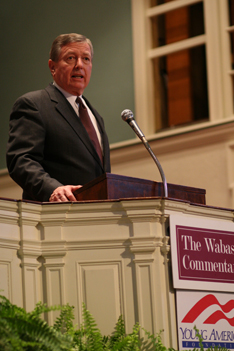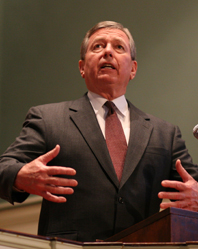John Ashcroft has a simple litmus test when weighing liberty against freedoms.
"The test should be that whenever we seek to implement a program or pass a statute, what is the probability our liberty will be protected more if we enact or don’t enact it."
 The former U. S. Attorney General spoke in the Wabash College Chapel Thursday night and recounted events of 9-11 and much of the Patriot Act's impact and the debates which have ensued. Ashcroft and his wife took a brief tour of campus, were guests at a private reception, and had dinner with invited guests after his speech. He did participate in a reported lively discussion in a late afternoon political science class led by Scott Himsel. (See a photo album of Ashcroft's visit here.)
The former U. S. Attorney General spoke in the Wabash College Chapel Thursday night and recounted events of 9-11 and much of the Patriot Act's impact and the debates which have ensued. Ashcroft and his wife took a brief tour of campus, were guests at a private reception, and had dinner with invited guests after his speech. He did participate in a reported lively discussion in a late afternoon political science class led by Scott Himsel. (See a photo album of Ashcroft's visit here.)
He challenged Wabash students that they and their generation will be the ones to solve the great debate of balancing liberty and freedom. "This is one problem you all will have to solve as you step forward to run America. You will have to reconcile this conflict."
Balancing liberty and freedom, and whether to enact laws or not, was a frequently reoccurring theme throughout the former Missouri governor and U.S. Senator’s remarks. Ashcroft vigorously defended actions of the Bush Administration and the Patriot Act. While the speech was largely non-political in nature, he was resolute in his defense of Bush Administration policies.
"This president has had a very restrained approach and has been criticized substantially," Ashcroft suggested. "In the process of seeking to defend America, the administration has been more restrained than any other U.S. administration in time of war."
Ashcroft frequently used history to draw comparisons to current events. He said George Washington was known to steam open letters and Abraham Lincoln tried to intercept messages from the Confederacy. He likened the attempts at espionage to the wiretapping programs which became so controversial shortly after 9-11.
It was his recounting of Sept. 11 which riveted the more than 700 in attendance as he began his remarks. Ashcroft was en route to Milwaukee to help promote a reading program when he learned of the attacks. After his plane re-fueled, while being guarded by a swat team, he returned to D.C. with a fighter jet escort.
 In defense of the administration’s approach to fighting terrorism right after the attacks, Ashcroft recalled his very first words when he arrived back at the Justice Department that day. "I said, ‘Think outside the box, but not outside the Constitution,’ " he said.
In defense of the administration’s approach to fighting terrorism right after the attacks, Ashcroft recalled his very first words when he arrived back at the Justice Department that day. "I said, ‘Think outside the box, but not outside the Constitution,’ " he said.
Ashcroft said the 9-11 attacks meant the U.S. had to re-think national security. Traditionally, wars have been between nations but now one man "with a gym bag" can kills hundreds if not thousands. "We have this new lethality and deliverability (of weapons) that changes the dynamic of defending this country."
He spent about 20 minutes taking questions from the audience, all of which came from students. He again provided a rhetorical answer to several of the inquiries, "If liberty is going to be totally obliterated isn’t it better to stop the terrorist act at the cost of some liberty?"
A question about the treatment of government detainees, which has been highly controversial since the revelations of Guantanamo Bay and Abu Graib, drew a detailed response about international law and rules of war. "There is a debate," Ashcroft said, "should people who violate the laws of war be the benefit of laws of war."
He said the United States would be at a tremendous disadvantage to say it was going to treat all prisoners by such laws regardless of the acts they might commit against us. And he noted the irony of nations abiding by the Geneva Convention developing weapons that limit civilian casualties versus terrorists’ weaponry designed to kill as many civilians as possible.
Ashcroft’s appearance was sponsored by The Commentary and the Young America’s Foundation.
Photos by Jim Amidon.